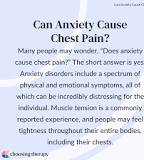The Connection Between Stress and Chest Pain
Stress is a common factor in our daily lives, affecting our mental and physical well-being. One of the physical manifestations of stress that many people experience is chest pain. While chest pain can be caused by various factors, including heart problems, it is essential to recognize the role that stress plays in this symptom.
When we are under stress, our body releases hormones like adrenaline and cortisol, which can lead to increased heart rate and blood pressure. This physiological response is known as the “fight or flight” response, designed to help us react quickly in threatening situations. However, chronic stress can keep these hormones elevated for extended periods, putting a strain on the heart and blood vessels.
As a result of prolonged stress, some individuals may experience chest pain or discomfort. This pain can vary in intensity and may feel like tightness, pressure, or aching in the chest area. It is important not to ignore chest pain, as it could be a sign of an underlying medical condition that requires prompt attention.
In addition to the direct impact of stress on the cardiovascular system, it can also contribute to unhealthy coping mechanisms such as smoking, overeating, or excessive alcohol consumption – all of which can further exacerbate chest pain and other health issues.
To address stress-related chest pain effectively, it is crucial to manage stress levels through relaxation techniques such as deep breathing exercises, meditation, yoga, or engaging in physical activity. Seeking support from a mental health professional or counselor can also be beneficial in developing healthy coping strategies and addressing underlying sources of stress.
If you are experiencing persistent or severe chest pain accompanied by other symptoms such as shortness of breath, dizziness, nausea, or sweating, seek immediate medical attention. While stress can contribute to chest pain, it is essential to rule out any serious medical conditions that may require treatment.
By recognizing the connection between stress and chest pain and taking proactive steps to manage stress effectively, individuals can improve their overall well-being and reduce the risk of experiencing debilitating symptoms.
Understanding Stress and Anxiety-Related Chest Pain: Duration, Relief, and Symptoms
- How long does anxiety chest pain last?
- How do you relieve chest pain from anxiety?
- How do you relieve chest pain from stress?
- How long does stress chest pain last?
- What are the symptoms of anxiety in the heart?
How long does anxiety chest pain last?
Anxiety chest pain can vary in duration depending on the individual and the underlying causes. In many cases, anxiety-related chest pain is temporary and may last for a few minutes to a few hours. However, for some individuals, the discomfort may persist for longer periods, especially if the anxiety triggers are ongoing or if there are underlying health conditions contributing to the pain. It is essential to monitor symptoms closely and seek medical advice if chest pain persists or worsens to rule out any serious medical issues and receive appropriate treatment.
How do you relieve chest pain from anxiety?
Relieving chest pain caused by anxiety involves addressing both the physical and emotional aspects of the condition. To alleviate chest pain from anxiety, individuals can practice relaxation techniques such as deep breathing exercises, progressive muscle relaxation, or mindfulness meditation to calm the mind and body. Engaging in physical activity, getting regular exercise, maintaining a healthy diet, and ensuring adequate sleep can also help reduce stress levels and alleviate chest pain. Seeking support from a mental health professional for therapy or counseling can provide effective coping strategies to manage anxiety and its physical symptoms, including chest pain. It is important to address anxiety holistically to promote overall well-being and reduce the frequency and intensity of chest pain episodes.
How do you relieve chest pain from stress?
To relieve chest pain caused by stress, it is essential to address the underlying source of stress and implement effective stress management techniques. Start by practicing relaxation exercises such as deep breathing, meditation, or progressive muscle relaxation to calm the mind and body. Engaging in physical activity, maintaining a healthy diet, and getting an adequate amount of sleep can also help reduce stress levels. Seeking support from a mental health professional or counselor to explore coping strategies and address emotional triggers is crucial in managing stress-related chest pain effectively. Remember that self-care practices and seeking professional guidance are key steps in relieving chest pain associated with stress.
How long does stress chest pain last?
The duration of stress-induced chest pain can vary from person to person and depends on various factors such as the individual’s stress levels, coping mechanisms, overall health, and the underlying cause of the chest pain. In some cases, stress-related chest pain may be acute and subside relatively quickly once the stressor is removed or managed effectively through relaxation techniques. However, if the stress is chronic or persistent, chest pain may recur or linger for an extended period. It is essential to monitor symptoms closely and seek medical advice if chest pain persists or worsens, as it could indicate a more serious underlying condition that requires attention.
What are the symptoms of anxiety in the heart?
When it comes to anxiety and its impact on the heart, individuals may experience a range of symptoms that can mimic those of a heart condition. Symptoms of anxiety in the heart may include palpitations, chest tightness or pain, rapid heartbeat, shortness of breath, and a feeling of impending doom. These physical sensations can be alarming and may lead individuals to believe they are having a heart attack. It is important to differentiate between anxiety-related symptoms and those indicative of a cardiac event by seeking medical evaluation to ensure proper diagnosis and appropriate treatment.



